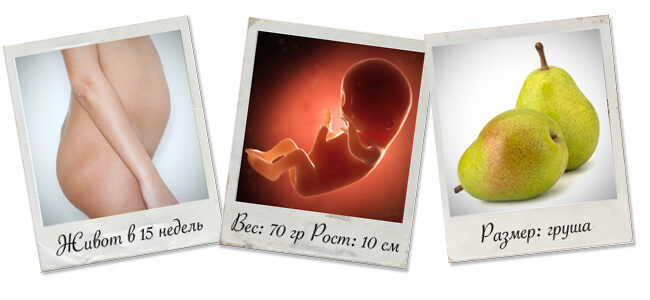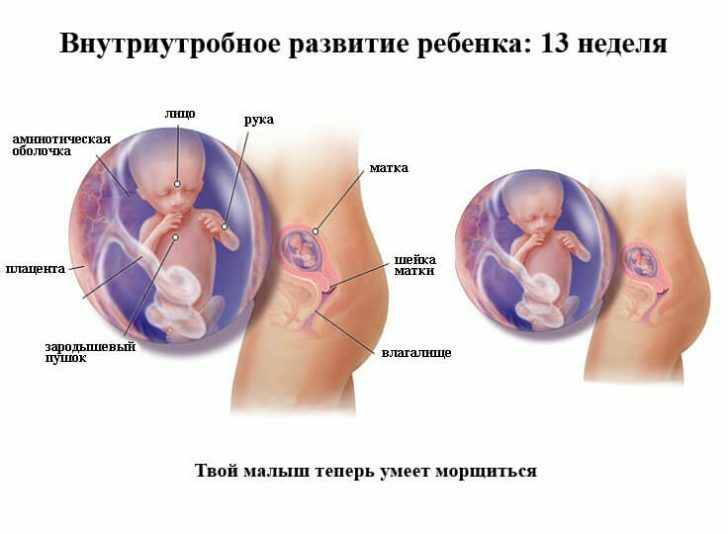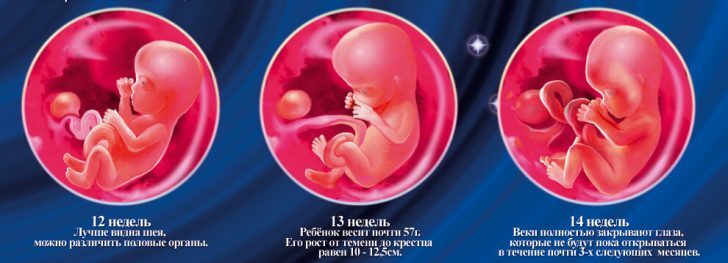34 week of pregnancy: what happens to the fetus and what does the woman feel?

At 34 weeks of gestation, the weight of the fetus exceeds 2 kg, the growth reaches 44-45 cm. The internal organs of the baby have almost completed their development, so in case of premature birth, serious health problems should not arise.However, it is better for the crumb to wait at least 4 more weeks, so that the adaptation to a completely new and unusual life passed for him as best as possible.
Table of contents: State of health and weight of the expectant mother Fetal development at 34 weeks of pregnancy Possible complications Visit to gynecologist, necessary examinations Nutrition in the third trimester of pregnancyState of health and weight of the expectant mother
The third trimester of pregnancy is considered the most difficult,, That in the middle of it many future mothers get tired of their situation. The big stomach prevents you from moving normally, dealing with everyday issues, sleeping and even serving yourself( for example, putting on and buttoning shoes, doing some hygienic and cosmetic procedures).Because of dyspnea, it becomes an impossible task to climb normally along several flights of stairs.Swelling of the feet does not allow you to wear your favorite shoes, socks leave unpleasant traces on the legs.The skin of the abdomen is very itchy, the loin, ribs, legs and arms hurts( tunnel syndrome often develops on this term).
This is also supplemented by various health problems:- Heartburn and impaired bowel movements.
- Hemorrhoids.
- Urine leakage.
- Varicose disease.
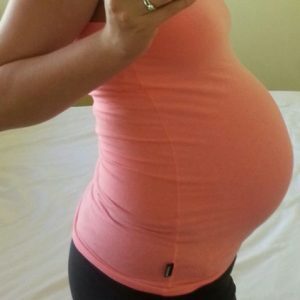 Of course, every future mummy has all the sensations.There are lucky ones who did not know what an early toxicosis is, and now they feel great.But most often a pregnant woman has to go through a lot of the above.
Of course, every future mummy has all the sensations.There are lucky ones who did not know what an early toxicosis is, and now they feel great.But most often a pregnant woman has to go through a lot of the above.
At 34 week, the issue of controlling the weight gain of the future mother is also acute.You should not break down in the last months of pregnancy and eat everything.Because of excess weight, problems in childbirth may arise, and then it will be much harder to get back into shape. The recommended increase in weight for a future mother this week is 200-300 g, the total increase should not exceed 12-13 kg.
Fetal development at week 34 of gestation
By this time the weight of the fetus reaches 2-2.2 kg, height - 44-45 cm. A small part of the body mass of the baby is fat.It accumulates under the skin, between the scapula, around the kidneys.The presence of a fat layer for the newborn plays an important role in the processes of thermoregulation, so the premature baby, who did not have enough time to store enough fat, requires additional warming.
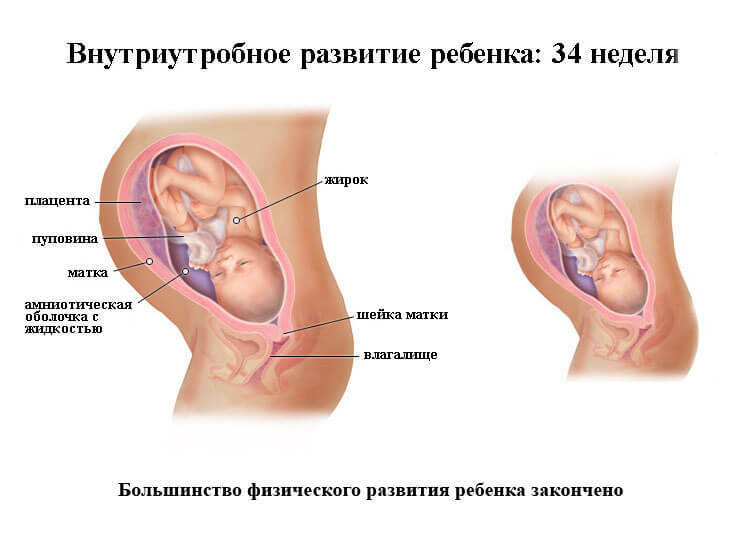
By the 34th week, the individual's metabolism is already established in the fetus. Its endocrine system actively produces hormones, and the brain controls everything that happens in the body.The kid already has a lot of things to do, for example, sucking a finger, grabbing an umbilical cord, imitating breathing( to carry out specific movements of the chest), swallowing amniotic waters, hiccup, yawn, blink, hear.
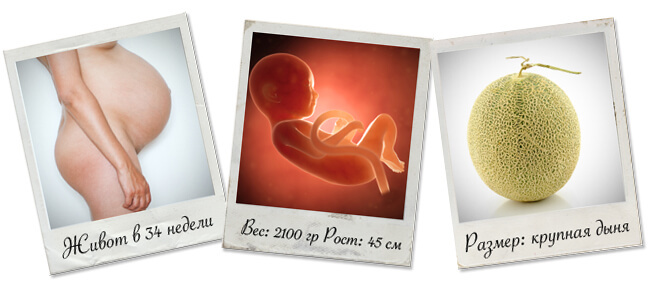
Due to the limited space inside the uterus at the 34th week of gestation, the fetal amplitude decreases and it assumes a position in which it is convenient or which it is forced to occupy. For example, if there are myoma nodes in the uterine cavity, if the umbilical cord is not long enough, if the placenta is not placed where it is necessary, the baby is most comfortable.And this is not always the position of the head down.He can drill down the booty or even lie down across the uterus.For crumbs, this is not harmful at all, but serious problems can arise in childbirth, so future mothers should not ignore going to the gynecologist and ultrasound examinations.In such situations it is better to plan in advance what the delivery will be( natural or operative).
Possible complications
What should I fear?First of all, premature birth.The greatest likelihood of onset of labor at week 34 is typical for:
- women who ignore the advice of doctors engaged in heavy physical and intellectual work, in constant stress;
- pregnant women with severe physical illness and / or infectious inflammatory processes in the reproductive organs;
- expectant mothers with ischemic-cervical insufficiency;
- women wearing under the heart of two or more children.
The fact that the birth is approaching can be said to flow from the vagina of fluid or blood, pulling and / or prolonging cramping pains in the abdomen, heaviness in the perineum.

Isolation from the genital blood can also be a sign of abruption of the normal or low-lying placenta. This threatening condition requires urgent medical attention.In addition, prognostically unfavorable at 34 weeks of gestation is an increase in blood pressure, swelling and the detection of urine in the urine.This may be a manifestation of gestosis.
Visit to the gynecologist, necessary examinations
 In the third trimester, you need to go to the gynecologist once in 2 weeks, therefore, consultations are likely to be scheduled for 34 weeks.If so, you must first pass urine( this, simple at first glance, the analysis carries a lot of information about the condition of a pregnant woman).During the visit, the doctor will check blood pressure, measure the weight and parameters of the patient's abdomen, determine the position of the fetus and listen to his heartbeat .If the expert suspects any deviations, will give directions to CTG or a more extensive examination, allowing to assess the condition of the baby, - biophysical profile.
In the third trimester, you need to go to the gynecologist once in 2 weeks, therefore, consultations are likely to be scheduled for 34 weeks.If so, you must first pass urine( this, simple at first glance, the analysis carries a lot of information about the condition of a pregnant woman).During the visit, the doctor will check blood pressure, measure the weight and parameters of the patient's abdomen, determine the position of the fetus and listen to his heartbeat .If the expert suspects any deviations, will give directions to CTG or a more extensive examination, allowing to assess the condition of the baby, - biophysical profile.
Biophysical profile - is a combined diagnostic procedure including cardiotocography and ultrasound, during which the specialist necessarily checks the number of amniotic fluid and a number of parameters from the fetal side:
- presence of respiratory movements;
- presence of movements of limbs and trunk;
- baby's body tone.
The result of the biophysical profile is the points that accrue for each of the test components( for CTG, the amount of amniotic fluid, etc.).The norm is 8-10 points.
Nutrition in the third trimester of pregnancy
The nutrition of the expectant mother should meet the needs of two organisms: female and child, so when choosing foods and dishes, a woman should give preference not only to what is tasty, but also to what is useful. These "benefits" include lean meat, milk and its derivatives, marine fatty fish, vegetables( especially spinach, bell pepper, carrots and beets), greens, fruits, nuts, vegetable oils, eggs and cereals( except manna). Using these products on a regular basis, the expectant mother will provide herself with good health, and the baby will have good health in the future.
In the third trimester, a woman who is expecting a baby should also follow these recommendations, but due to a number of problems that arise in the last months of pregnancy( constipation, heartburn, hemorrhoids, edema), she will not be bothered to make some adjustments to the diet:
- Reduce the amount of salt added to food.
- Exclude spices, smoked products, pickles, chocolate, peanuts, citrus fruits.
- Increase the proportion of marine fish in the diet.
- Do not eat abundantly before going to bed.
- Divide the daily volume of food into 6-7 receptions.
- Use regularly lactic acid foods, prunes, beets, carrots and apples.These products facilitate the emptying of the intestine.
- For heartburn, drink jelly, milk, vegetables and fruits cook or bake, cook meat and fish for a couple, choose fatty sorts of cottage cheese and sour cream( they are less acidic).
In general, the expectant mother should not be too restrictive in eating.But this does not mean that it is possible to eat with mykes the mayonnaise salads and macaroni with a snack with white bread and rolls. To satisfy hunger is necessary for that, it is useful, for example, meat with vegetable garnish, porridges with fruit or milk, a slice of hard cheese, fish casserole.
Regarding the drinking regime, it should not change particularly in the third trimester( dehydration is even more dangerous than excess fluid).However, there is one important condition - the expectant mother needs to observe the low-salt diet of , otherwise all the fluid will stay in the body in the form of edema.
Zubkova Olga Sergeevna, medical reviewer, epidemiologist

